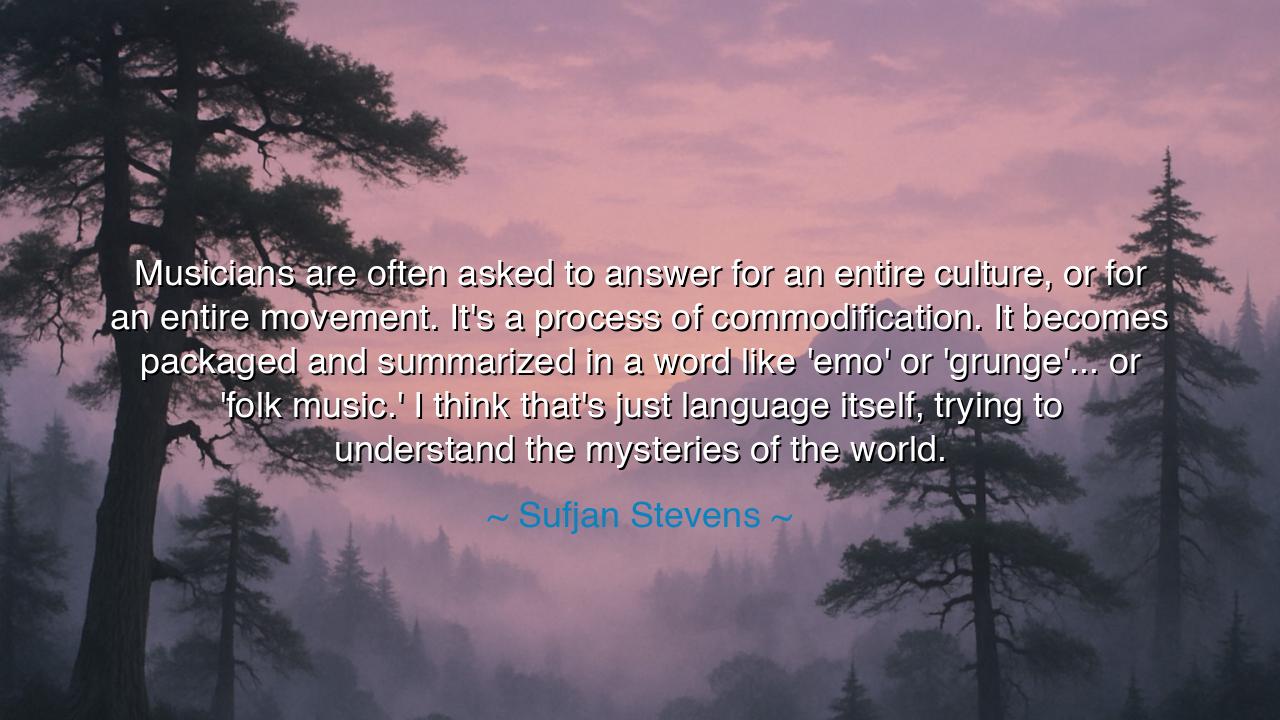
Musicians are often asked to answer for an entire culture, or
Musicians are often asked to answer for an entire culture, or for an entire movement. It's a process of commodification. It becomes packaged and summarized in a word like 'emo' or 'grunge'... or 'folk music.' I think that's just language itself, trying to understand the mysteries of the world.






The gentle yet piercing voice of Sufjan Stevens, poet of sound and seeker of subtle truths, once declared: “Musicians are often asked to answer for an entire culture, or for an entire movement. It’s a process of commodification. It becomes packaged and summarized in a word like ‘emo’ or ‘grunge’... or ‘folk music.’ I think that’s just language itself, trying to understand the mysteries of the world.” At first, his words may seem like a simple observation about genres and labels, but in truth they touch upon one of the oldest struggles of humankind: the tension between the mystery of life and the limits of language.
To be asked to represent an entire culture or movement is a burden placed upon many artists. Society longs to name and contain what it cannot fully understand. Thus, the vast, living river of music is poured into the narrow vessel of a single word. A thousand stories, sorrows, and songs are reduced to the syllables of “grunge” or “emo.” Stevens calls this the process of commodification, for once named, the art becomes not only identified, but packaged, sold, and consumed. What was once mysterious and fluid becomes a product upon a shelf.
Yet Stevens does not speak with bitterness alone; he also recognizes the innocence of this act. He says, “I think that’s just language itself, trying to understand the mysteries of the world.” Here lies the heart of his wisdom. Humanity has always sought to capture the infinite with words, to bind mystery with syllables, to name the unnameable. From the earliest myths carved in stone, to the poets who gave names to love and loss, to the critics who reduce movements into labels—this is the same impulse: to make the vastness of experience comprehensible through words.
History provides its testimony. When jazz first emerged from New Orleans, it was not a single style but a storm of cultures, rhythms, and improvisations. Yet soon it was packaged with a name, and “jazz” became both a label and a market. When the angry cries of youth in the 1990s burst forth as grunge, record companies stamped the word upon every band with distorted guitars, reducing individuality to trend. Yet within these labels were living human beings—Nirvana, Pearl Jam, Alice in Chains—each with their own voice, their own mystery. Stevens’ words remind us not to confuse the label for the living river that flows beneath it.
There is also a danger here: that by reducing the mysterious to a label, we forget its depth. Folk music, for example, is not one thing but many—it is the cry of a farmer in the fields, the hymn of exiles, the song of rebellion whispered around fires. To call it one thing is to miss its many faces. And yet, without labels, how could we speak of it at all? Thus we see the paradox Stevens describes: language is both a tool of understanding and a veil that obscures.
The lesson for us is clear: we must use language as a bridge, not a cage. Let the labels guide us toward understanding, but do not mistake them for the fullness of the truth. Respect the mystery that lies beneath every word, every genre, every movement. When you hear a label like “emo” or “grunge,” remember that it is only a keyhole through which we glimpse a much vaster house. The true experience must be entered, not summarized.
Practically, this means: listen deeply. When someone speaks of music, or culture, or life itself, do not be content with the label—ask for the story. Seek the humanity beneath the word. Honor artists not as spokesmen for a trend, but as individuals whose work arises from their own heart and history. And in your own speech, be cautious with labels; use them lightly, remembering that every word is only a shadow of the mystery it seeks to name.
So let Sufjan Stevens’ wisdom echo in your mind: language tries to understand the mysteries of the world, but it can never fully contain them. Honor the mystery. Do not allow labels to reduce life into products. Instead, let words be doorways, opening into deeper listening, deeper respect, and deeper wonder for the vast river of human creativity that no single word can ever hold.






AAdministratorAdministrator
Welcome, honored guests. Please leave a comment, we will respond soon